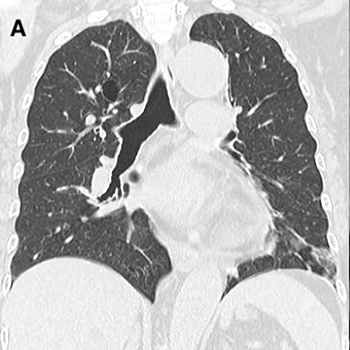Abstract
Introduction: The detection of pneumococcal antigens in urine is an alternative to gram staining, and their culture is central to the diagnosis of pneumococcal pneumonia. We present a case of the false-positive detection of urinary Streptococcus species pneumococcal antigen with a BinaxNOW test. This resulted in delayed diagnosis of a liver abscess.
Case description: A 70-year-old woman presented to the emergency department with a 1-day history of chills and difficulty walking. She had a fever and her physical examination was normal. Non-contrast chest computed tomography (CT) revealed a slight ground-glass opacity in the left lower lobe. Laboratory tests revealed liver injury and elevated C-reactive protein levels. A urinary pneumococcal antigen test was positive, and she was diagnosed with acute bronchopneumonia caused by Streptococcus pneumoniae. She was treated with ceftriaxone. However, abdominal contrast-enhanced CT performed the next day revealed portal vein thrombus and a left lobe liver abscess. Streptococcus constellatus was detected in a puncture specimen of the liver abscess. It was concluded that the positive urinary pneumococcal antigen test was a false-positive owing to Streptococcus infection.
Discussion: False-positive results might be explained by the presence of C-polysaccharide antigens in the cell wall of S. pneumoniae. The positive urinary antigen test together with the finding of slight ground-glass opacity in the left lung on chest CT initially led to misdiagnosis. False positives may result in misdiagnosis and unnecessary antimicrobial therapy.
Conclusion: The overuse of the pneumococcal urinary antigen tests can lead to false positives and misdiagnosis.
References

Views: 879
HTML downloads: 136
PDF downloads: 381
Published:
2022-02-14
Issue:
2022: Vol 9 No 2
(view)










